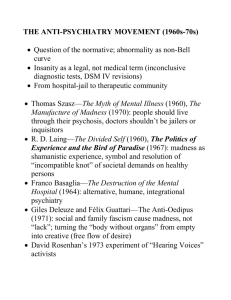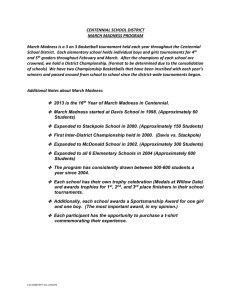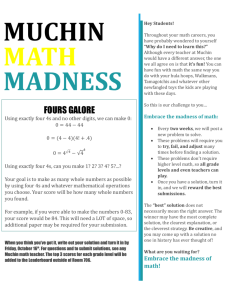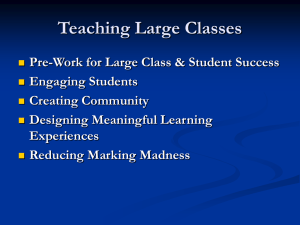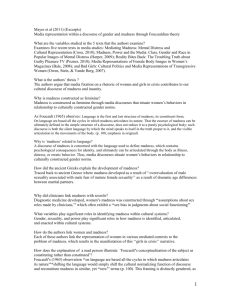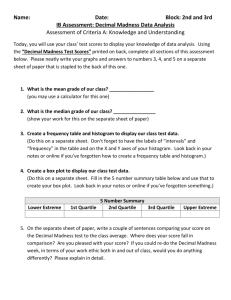Leaving Class - Haiku Learning
advertisement
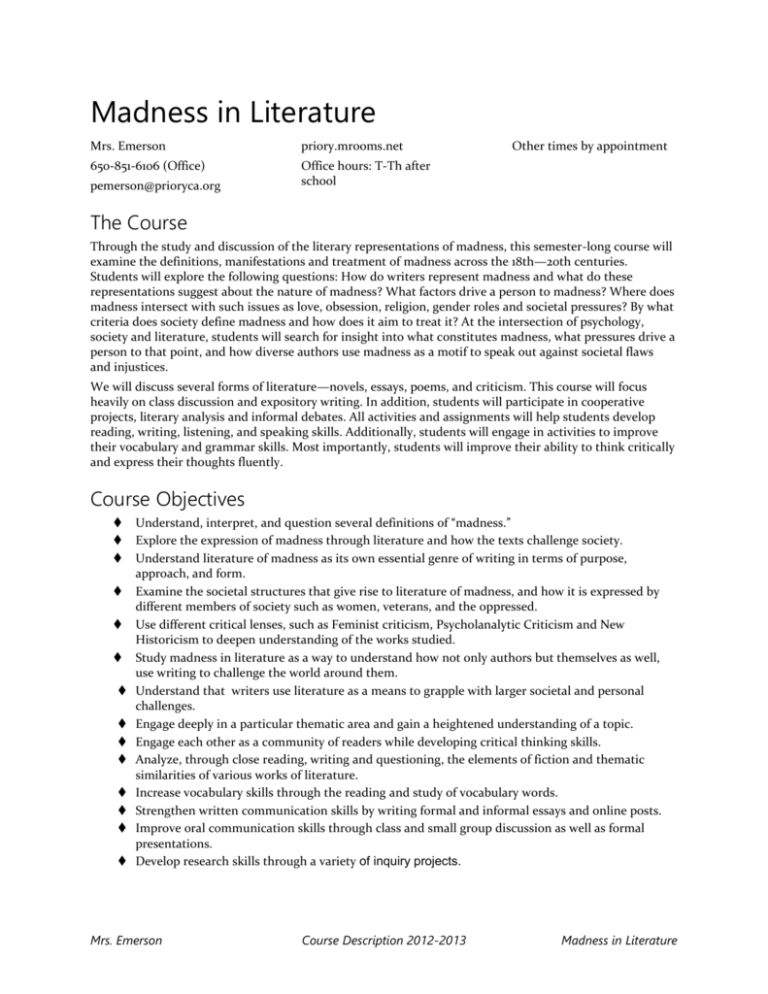
Madness in Literature Mrs. Emerson priory.mrooms.net 650-851-6106 (Office) Office hours: T-Th after school pemerson@prioryca.org Other times by appointment The Course Through the study and discussion of the literary representations of madness, this semester-long course will examine the definitions, manifestations and treatment of madness across the 18th—20th centuries. Students will explore the following questions: How do writers represent madness and what do these representations suggest about the nature of madness? What factors drive a person to madness? Where does madness intersect with such issues as love, obsession, religion, gender roles and societal pressures? By what criteria does society define madness and how does it aim to treat it? At the intersection of psychology, society and literature, students will search for insight into what constitutes madness, what pressures drive a person to that point, and how diverse authors use madness as a motif to speak out against societal flaws and injustices. We will discuss several forms of literature—novels, essays, poems, and criticism. This course will focus heavily on class discussion and expository writing. In addition, students will participate in cooperative projects, literary analysis and informal debates. All activities and assignments will help students develop reading, writing, listening, and speaking skills. Additionally, students will engage in activities to improve their vocabulary and grammar skills. Most importantly, students will improve their ability to think critically and express their thoughts fluently. Course Objectives Understand, interpret, and question several definitions of “madness.” Explore the expression of madness through literature and how the texts challenge society. Understand literature of madness as its own essential genre of writing in terms of purpose, approach, and form. Examine the societal structures that give rise to literature of madness, and how it is expressed by different members of society such as women, veterans, and the oppressed. Use different critical lenses, such as Feminist criticism, Psycholanalytic Criticism and New Historicism to deepen understanding of the works studied. Study madness in literature as a way to understand how not only authors but themselves as well, use writing to challenge the world around them. Understand that writers use literature as a means to grapple with larger societal and personal challenges. Engage deeply in a particular thematic area and gain a heightened understanding of a topic. Engage each other as a community of readers while developing critical thinking skills. Analyze, through close reading, writing and questioning, the elements of fiction and thematic similarities of various works of literature. Increase vocabulary skills through the reading and study of vocabulary words. Strengthen written communication skills by writing formal and informal essays and online posts. Improve oral communication skills through class and small group discussion as well as formal presentations. Develop research skills through a variety of inquiry projects. Mrs. Emerson Course Description 2012-2013 Madness in Literature Honors Students with the honors designation will be expected to have a higher level of both motivation and skills. Honors students will demonstrate strong foundations in critical reading and a strong understanding of writing organization and clarity. They will be required to read one additional text as well as supplemental readings outside of class, propose their own reading schedule, and write a full-length formal essay based on the reading. Expectations To be successful in this class, you must exhibit the behavior of engaged, independent learners. Specifically, respect your peers, the teacher and the classroom itself, actively read all assignments on time, question ideas critically, refrain from private discussions during class, and be prepared and on time. During class, you are expected to have the reading assigment for the day open and on your desk in front of you. You must have a pen or pencil ready to make annotations or take notes. Your attentiveness to the aforementioned topics will determine the quality of your work and will shape your class participation grade. You earn a participation grade, so always act with integrity. I also expect you to follow all school rules, to be responsible for your actions, and to accept the consequences of your choices. I will enforce school rules when necessary. Grading Policy Your grade will be determined by the following system: Mastery: This category assesses your mastery of course content and skills and includes all major writing assessments, projects, and tests (45%). Scaffolding: This category assesses your performance on all work that prepares you for mastery assessments and includes minor writing assessments, informal responses to literature, homework, quizzes, vocabulary, and grammar (45%). Participation: This category assesses your performance during in-class/group work and discussions (10%). Paper Policy Formal, non-timed writing assignments can be rewritten. Students will receive their formal essays with margin comments, but no grade. They may choose to rewrite the essay based on teacher comments. However, if they choose not to revise, they will receive their letter grade at that time. The revised paper must be turned in within a week from the return of the original paper. A revision represents a student’s critical re-working of the paper. Papers that have addressed editor’s marks only are not revisions and will not be accepted as such. Conference with the teacher is strongly encouraged and in some cases mandatory to discuss strategies for making the paper better. Materials Required Texts Jane Eyre, by Charlotte Bronte Wide Sargasso Sea, by Jean Rhys ISBN: 978-0-393-30880-8 Edition: 1966 Publisher: W.W. Norton & Co. Slaughterhouse-Five, by Kurt Vonnegut ISBN: 978-0-385-33384-9 Edition: 1969 Publisher: Delta Books Notes from Underground, by Fyodor Dostoevsky: ISBN-10: 0-679-73452-X; ISBN-13: 978-0-67973452-9 Vocabulary Workshop : Level ____, by Jerome Shostak ISBN: 978-0-8215-7112-5 Edition: 2005 Mrs. Emerson Course Description 2012-2013 Madness in Literature Publisher: Sadlier-Oxford Required Materials A looseleaf binder to take daily notes and do daily in-class writing. You will be passing in work that you do in class regularly. Suggested divisions for your binder: Notes, Writing, Handouts, Reference Day planner for keeping record of your assignments Book(s) being discussed There will be an all-semester book & binder check at the beginning of the third week of school. Please bring all required books for the semester to the book check. You will be getting homework points. Starting Class I will start class when the schedule says class begins. We will start each day with a moment of silence and meditation. If you arrive after we begin, you will be considered tardy. Tardiness If you are tardy, you must sign in using the sign-in sheet at the door. Please write your name and your time of arrival. Excessive tardies will result in detention and, if necessary, further disciplinary action in accordance with Woodside Priory’s tardy policy. Leaving Class If you need to leave class to use the rest room, you may discretely leave at any time during the lesson without asking me; however, you first must sign out using the sign-out sheet at the door. Please record the time that you leave, the time that you return, and the purpose of your absence from class. I will periodically review the sign-out list. Excessive departures from class will result in detention, and, if necessary, confine you to the classroom for the rest of the school year. Please be wise about your need to leave class. Homework You must prepare for each class by reading the assigned work actively and critically. Learning to think critically means formulating your own questions, opinions and interpretations about a work of literature, not relying solely on someone else’s interpretation. Your participation grade depends in part on your shared observations. Come to class ready to discuss what you’ve read: read poems at least three times, review difficult passages in novels, and look up new and unfamiliar words in the dictionary. You are expected to keep all homework in your binder and keep a homework calendar that I will give you. I will check homework during warm-up exercises. Be prepared with your homework and calendar ready at the beginning of class. Late Work You must turn in homework at the beginning of the period. I consider late work any work not turned in at the time I request it. You may turn in late work at the beginning of the next class meeting for 50% of the original grade. I will not accept work turned in any later than this time. Presentations, group handouts and similar projects affecting the entire class cannot be done late. Students not ready on their scheduled day will receive a zero. Make-up Work You are responsible for finding out about missed assignments at a time that does not interrupt class, preferably from another student or during my office hours. I will accept make-up work for excused absences only. If the absence is school related, the work must be picked up before the day of absence and turned in Mrs. Emerson Course Description 2012-2013 Madness in Literature upon your return. You must make up exams and quizzes missed because of an absence within 48 hours. It is your responsibility to arrange a time with the teacher in person. You will lose a half a letter grade per day for each day you delay making up a major assignment after an excused absence after the initial 48 hours. If you miss a quiz because of a tardy, you will receive a zero on that quiz. All late major assignments not excused by a valid absence will be reduced by half a letter grade per day. After 3 days, you receive a zero. Extensions Extensions may be granted only after discussing the matter with the teacher in person and at the teacher’s discretion based upon individual circumstances. Extensions will not be granted over email the day before the assignment is due. Laptop Usage during Class Students may not use laptops during class without written permission and an accommodation by Brother Edward. If you have permission but use your laptop for purposes not related to class, you will have your privileges revoked for the remainder of the year. Students may use laptops for group projects if the teacher gives explicit permission to do so. Students are instead expected to have the day’s reading assignment ready to annotate during class time. Academic Honesty As one of Priory’s five Benedictine values, integrity is taken very seriously in this classroom. Consequently, you are not permitted to give or receive aid on tests, quizzes, essays or on any other graded work, unless I have given you explicit permission to do so. Some examples of conduct which violate academic integrity include: Copying from another’s test or quiz or allowing another to copy from your own test or quiz Using material on a test or essay which does not reflect your own work or ideas Discussing an in-class graded assignment with a student who has not completed that assignment Unpermitted collaboration on a take-home assignment (e.g., take-home essay) (See “Note on Tutors” below) Plagiarism (taking someone else’s work or ideas and passing them off as your own; failing to cite someone else’s ideas using MLA) However, the following conduct is permitted: Working with a teammate on a group project Using ideas and language from an outside source on an essay provided that outside research is permitted and you cite the source correctly (we’ll go over this) Preparing for a test, quiz, or in-class essay with a parent, tutor, or another student provided that you are an equal participant in that preparation. (See “Note on Tutors” below) Violations of this academic integrity policy will result in an automatic zero for the assignment and may also involve a meeting with Mr. Schlaak and your parents. Repeated offenses may result in a notification on your transcript, suspension, or even expulsion. Note on Tutors I understand that many of you have tutors. This is acceptable; and, in many cases, tutors can be beneficial to your growth as a writer. However, you need to be careful that your work is just that—yours. Keep in Mrs. Emerson Course Description 2012-2013 Madness in Literature mind, turning in work that does not sufficiently reflect your own voice and style constitutes cheating under Priory’s academic policy. To avoid turning in work that is “overly-tutored,” I strongly suggest that you follow these guidelines: 1. 2. 3. 4. 5. Never compose with your tutor. Write the entire first draft by yourself. Allow your tutor to make suggestions and point out places where the writing is awkward or unclear, but do not allow him or her to rewrite your sentences. Choose your own words – do not allow your tutor to substitute “fancier” words for your own. Once your tutor has made his or her suggestions, revise the paper, proofread your work, and turn it in. Do not meet with your tutor a second time for the same assignment. You should be the final editor. If you are using a tutor, please have him or her contact me so that we can communicate with one another. Reading Schedule The following schedule lists topics and all major assessments by month. This schedule is subject to change as class evolves. Fall Semester Month August Primary Texts Intro to Madness September Jane Eyre & Wide Sargasso Sea October Notes From Underground November Slaughterhouse Five December Independent Research Mrs. Emerson Assessment Summer Reading Assessment, Group Presentation on History of Madness, Critical Response Paper Response Papers, Passage Analysis, Debate, Formal Essay Analytical Writing, Design Thinking, Response Papers In-Class Essay, Service Learning Project, Response Papers, Final Paper Student-directed research paper Course Description 2012-2013 Madness in Literature
